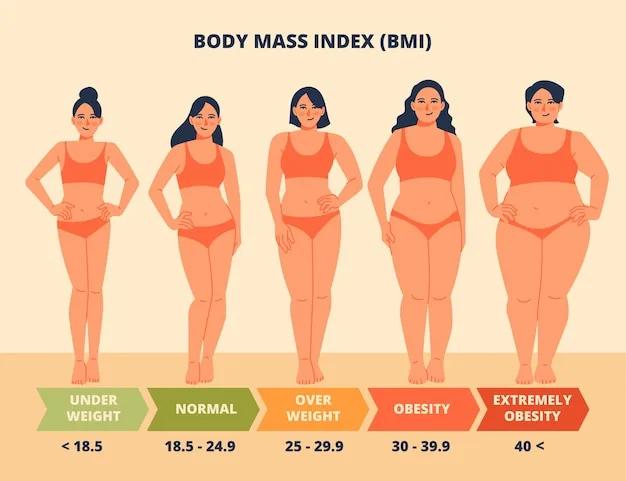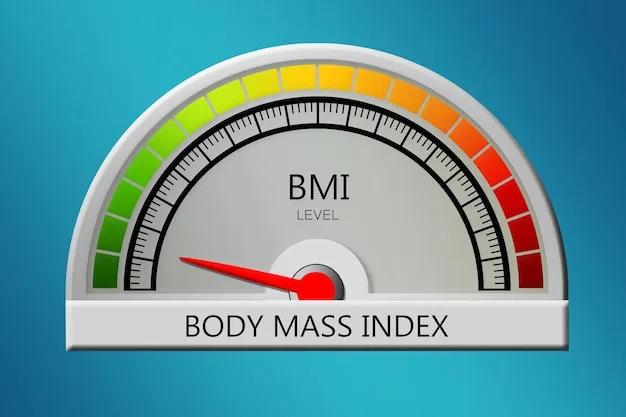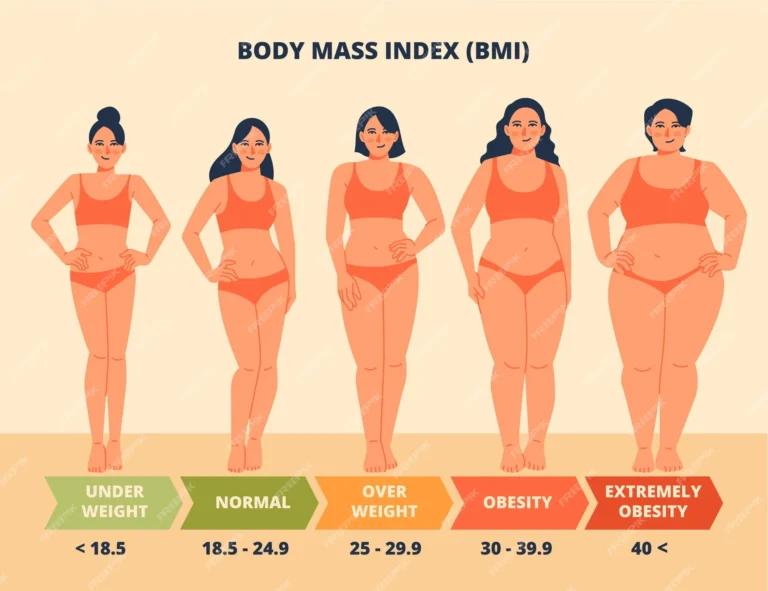
September 17, 2025 (Current Version)
March 28, 2025
Maintaining a healthy body weight is crucial for health benefits and disease prevention. A high BMI (Body mass index) and excess body fat can increase the risk of developing chronic diseases and health conditions. On the other hand, being underweight also poses health risks. In this comprehensive guide, we will explore the significance of maintaining a healthy BMI and how it can contribute to disease prevention. We will delve into the factors that influence weight, discuss the role of diet, healthy eating and physical activity, and provide practical tips for achieving and maintaining a healthy weight through health promotion.
Understanding Body Mass Index (BMI)
Body Mass Index (BMI) is a widely used screening tool to estimate weight status about potential disease risk. It is calculated by dividing a person’s weight in kilograms by the square of their height in meters. While BMI is not a diagnostic tool for disease risks, using a BMI calculator provides a general indication of body fatness and health status.
BMI ranges can be used to assess weight status:
- Underweight: BMI less than 18.5
- Healthy Weight: BMI between 18.5 and 24.9
- Overweight: BMI between 25.0 and 29.9
- Obese: BMI 30.0 or higher
It’s important to note that BMI is not suitable for everyone, such as athletes or individuals with a high muscle mass. A trained healthcare provider can perform additional assessments to evaluate an individual’s health status and risks.
Factors influencing weight
Maintaining a healthy weight is influenced by various factors, including genetics, age, gender, metabolism, environment, lifestyle, and habits. While some factors are beyond our control, such as genetics, there are many aspects we can modify to achieve and maintain a healthy weight.
Genetics
Genetics play a role in determining our body shape, metabolism, and susceptibility to weight gain. Some individuals may have a genetic predisposition to obesity or find it more challenging to lose weight. However, genetics do not solely determine our weight, and lifestyle factors still play a significant role.
Age and metabolism
Metabolism, the process by which the body converts food and oxygen into energy, can change as we age. This can result in a slower metabolic rate, making it easier to gain weight and more difficult to lose weight. As we age, it becomes crucial to adjust our eating habits and physical activity levels to maintain a healthy weight.
Environment and lifestyle
Our environment and lifestyle factors greatly influence our weight. Factors such as access to healthy food options, socioeconomic status, cultural influences, and built environments can impact our dietary choices and physical activity levels. Making conscious choices in our environment and adopting healthy lifestyle habits can contribute to maintaining a healthy weight.
The link between weight and disease risk
Maintaining a healthy weight is essential for preventing various diseases and health conditions. Both excess body fat and being underweight can have a higher risk of developing health problems. Let’s explore the potential health risks associated with different weight statuses.
Health risks of excess body weight
Carrying excess body weight, especially in the form of body fat, increases the risk of numerous diseases and health conditions. Here are some of the health risks associated with being overweight or obese:
- Heart disease: Excess weight puts a strain on the heart and increases the risk of developing cardiovascular disease, including conditions like high blood pressure, high cholesterol levels, and coronary artery disease
- Type 2 diabetes: Obesity is a significant risk factor for developing type 2 diabetes. Excess body fat affects insulin resistance, leading to elevated blood sugar levels.
- Hypertension: High blood pressure is more prevalent in individuals with excess body weight. It increases the strain on the heart and blood vessels, increasing the risk of heart disease and stroke
- Certain cancers: Obesity is associated with an increased risk of developing various types of cancer, including breast, colon, kidney, and pancreatic cancer
- Sleep apnea: Excess weight can contribute to sleep apnea, a sleep disorder characterized by interrupted breathing during sleep. Sleep apnea can lead to daytime fatigue, cardiovascular problems, and other health issues
- Osteoarthritis: The excess weight puts stress on the joints, increasing the risk of developing osteoarthritis, a degenerative joint disease
- Gallbladder disease: Obesity increases the risk of developing gallstones and other gallbladder-related problems
- Fatty liver disease: Excess body weight can lead to a buildup of fat in the liver, increasing the risk of non-alcoholic fatty liver disease (NAFLD)
- Mental health issues: Obesity can contribute to mental health problems, including depression, low self-esteem, and body image issues
Health risks of being underweight
While excess weight poses health risks, being underweight is also associated with potential health problems. Some of the health risks of being underweight include:
- Nutritional deficiencies: Being underweight may indicate inadequate nutrient intake, leading to deficiencies in essential vitamins and minerals
- Weakened immune system: Insufficient body weight can weaken the immune system, making individuals more susceptible to infections and illnesses
- osteoporosis: Inadequate body weight can contribute to reduced bone density and increase the risk of osteoporosis, a condition characterized by weakened and brittle bones
- Fertility issues: Being underweight can disrupt hormonal balance and affect reproductive health, leading to irregular menstrual cycles and difficulties conceiving
- Impaired healing and recovery: Underweight Individuals may experience delayed wound healing, prolonged recovery from illnesses, and increased susceptibility to infections
Maintaining a healthy weight is crucial for minimizing the risk of these health conditions and promoting overall well-being.
The role of diet in weight management
Diet plays a significant role in achieving and maintaining a healthy weight. It is important to adopt a balanced and nutritious eating pattern that supports overall health and provides the necessary energy for daily activities. Here are some key principles for a healthy diet:
Balance and variety
Aim for a balanced diet that incorporates a variety of nutrient-dense foods. Include foods from all food groups, such as fruits, vegetables, whole grains, lean proteins, and healthy fats. This ensures you receive a wide range of essential vitamins, minerals, and antioxidants.
Caloric intake
To achieve weight loss, it is important to create a calorie deficit. This can be achieved by reducing daily caloric intake while still meeting your nutrient needs. Reducing 500 calories per day can lead to a gradual and sustainable weight loss of approximately 1 pound per week.
Portion control
Controlling portion sizes is crucial for weight management. Be mindful of serving sizes and avoid oversized portions. Use smaller plates and bowls to help control portion sizes visually.
Nutrient density
Focusing on nutrient-dense foods can help you achieve and maintain a healthy weight. Nutrient-dense foods are low in calories but rich in essential nutrients. Choose foods like fruits, vegetables, whole grains, lean proteins, and healthy fats.
Hydration
Staying adequately hydrated is important for overall health and weight management. Opt for water as the primary beverage and limit sugary drinks, which can contribute to excess calorie intake.
The role of physical activity in weight management
Physical activity is a key component of achieving and maintaining a healthy weight. Regular exercise not only burns calories but also improves cardiovascular fitness builds muscle strength, and enhances overall well-being. Here are some important points to consider:
Types of physical activity
Incorporate a mix of aerobic exercise, strength training, and flexibility exercises into your routine. Aerobic exercises, such as brisk walking, jogging, cycling, or swimming, help burn calories and improve cardiovascular health. Strength training exercises, such as weightlifting or bodyweight exercises, help build muscle mass and increase metabolism. Flexibility exercises, like yoga or stretching, improve joint mobility and prevent injuries.
Recommended activity levels
The Centers for Disease Control and Prevention (CDC) recommends at least 150 minutes of moderate-intensity aerobic activity or 75 minutes of vigorous-intensity aerobic activity per week. Spread your activity throughout the week and aim for at least 30 minutes of exercise on most days.
Active lifestyle
Incorporate physical activity into your daily routine. Take the stairs instead of the elevator, walk or bike to work, and engage in activities you enjoy, such as dancing, gardening, or playing sports. Every bit of movement counts towards achieving a healthy weight.
Seek professional guidance
If you have any underlying health conditions or concerns, consult with a healthcare provider or a certified fitness professional before starting a new exercise program. They can provide personalized recommendations based on your individual needs and help you set realistic goals.
Strategies for achieving and maintaining a healthy weight
Reaching and maintaining a healthy weight is a long-term commitment. Here are some practical strategies to help you achieve your weight management goals:
Set realistic goals
Set achievable and realistic goals. Aim for gradual weight loss of 1-2 pounds per week to ensure sustainable results. Avoid crash diets or extreme weight loss methods, as they are often not sustainable and can be detrimental to your health.
Mindful eating
Practice mindful eating by paying attention to hunger and fullness cues. Eat slowly, savor each bite, and listen to your body’s signals. This can help prevent overeating and promote a healthier relationship with food.
Portion control
Be mindful of portion sizes and avoid oversized servings. Use smaller plates and bowls to help control portion sizes. Take your time to enjoy your meals and avoid distractions while eating.
Regular physical activity
Incorporate regular physical activity into your routine. Find activities you enjoy and make them a part of your daily life. Aim for a combination of aerobic exercise, strength training, and flexibility exercises to achieve overall fitness and weight management.
Seek support
Consider seeking support from friends, family, or a support group. Having a support system can provide motivation, accountability, and guidance throughout your weight management journey.
Track progress
Keep track of your progress to stay motivated and monitor your achievements. Use tools like a food diary or a fitness app to record your meals, exercise sessions, and progress over time.
Lifestyle changes
Focus on making sustainable lifestyle changes rather than relying on quick fixes. Adopt healthy habits that you can maintain in the long term, such as regular physical activity, balanced eating, and stress management techniques.
Additional factors affecting weight management
In addition to diet and physical activity, several other factors can influence weight management. These factors include:
Sleep
Getting adequate sleep is crucial for weight management. Lack of sleep can disrupt hormone levels, increase appetite, and contribute to weight gain. Aim for 7-9 hours of quality sleep per night.
Stress
Stress can affect weight management by triggering emotional eating and disrupting normal eating patterns. Find healthy ways to manage stress, such as practicing relaxation techniques, engaging in hobbies, or seeking support from a professional.
Environment and social factors
The environment we live in and our social interactions can impact our weight management efforts. Surround yourself with a supportive environment that promotes healthy choices. Seek opportunities for physical activity, choose healthy food options, and engage in social activities that don’t solely revolve around food.
Conclusion
Maintaining a healthy BMI is essential for disease prevention and overall well-being. You can achieve and maintain a healthy weight by adopting a balanced and nutritious diet, incorporating regular physical activity, and practicing healthy lifestyle habits. Remember to set realistic goals, seek support when needed, and make sustainable changes that align with your individual needs and preferences. Prioritize your health and make weight management a lifelong commitment for a healthier and happier future.
References:
- Maintain a Healthy Weight
- Maintaining a Healthy Weight | National Institute on Aging – NIA
- Healthy Weight, Nutrition, and Physical Activity – Healthy Weight, Nutrition, and Physical Activity – CDC
Medical Disclaimer
NowPatient has taken all reasonable steps to ensure that all material is factually accurate, complete, and current. However, the knowledge and experience of a qualified healthcare professional should always be sought after instead of using the information on this page. Before taking any drug, you should always speak to your doctor or another qualified healthcare provider.
The information provided here about medications is subject to change and is not meant to include all uses, precautions, warnings, directions, drug interactions, allergic reactions, or negative effects. The absence of warnings or other information for a particular medication does not imply that the medication or medication combination is appropriate for all patients or for all possible purposes.











